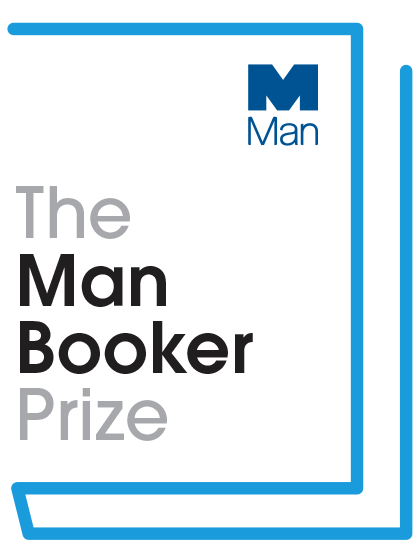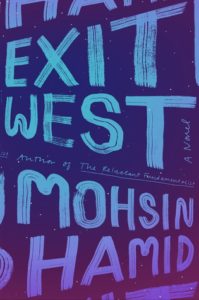Image: © Booker Prize Foundation
 Despite the very film/TV-centric approach we have here at The Reel Bits, we spend a fair bit of our time reading as well. As luck would have it, the Man Booker Shortlist for the year happened to fall within our carefully planned reading lists.
Despite the very film/TV-centric approach we have here at The Reel Bits, we spend a fair bit of our time reading as well. As luck would have it, the Man Booker Shortlist for the year happened to fall within our carefully planned reading lists.
With the winners announced later this month, here we take the opportunity to dissect the nominees. For our money, we reckon that EXIT WEST or AUTUMN are a good chance for the prize, both coming with a highly topical set of issues that more people should know about.
What are your favourites? Did something get left off the list you wanted on? Let us know in the comments below.
4 3 2 1 – Paul Auster
 The wonderful and divisive Paul Auster is no stranger to awards, but this is the first new Auster work in almost 7 years. One of the longest books in the author’s bibliography, he reportedly worked on it 7 days a week for 3 years and wrote the 866 page tome in longhand.
The wonderful and divisive Paul Auster is no stranger to awards, but this is the first new Auster work in almost 7 years. One of the longest books in the author’s bibliography, he reportedly worked on it 7 days a week for 3 years and wrote the 866 page tome in longhand.
The narrative itself is equally epic, with the title referring to the tale of Archie Ferguson being told four different ways. The different versions of Archie make different life choices throughout the 50s/60s setting, resulting in different outcomes, but the presence of his love interest Amy Schneiderman remains a constant. No sooner do we celebrate one Archie’s success than we are lamented tragedy in another thread. That’s the nature of life though, isn’t it?
For many this will be too weighty a slog, while for others it will be the microcosm of a life that could have happily kept going for another 800 pages. Either way, it is difficult not to feel something for Archie, no matter which one you find yourself empathising with.
Exit West – Mohsin Hamid
 “The only divisions that mattered now were between those who sought the right of passage and those who would deny them passage, and in such a world the religion of the righteous must defend those who sought passage.”
“The only divisions that mattered now were between those who sought the right of passage and those who would deny them passage, and in such a world the religion of the righteous must defend those who sought passage.”
The most surprising things about EXIT WEST are the fantastical elements, doors that facilitate instantaneous passage between faraway borders. Replace those doors for ‘boats’ or any other type of vessel, and you have a perfect metaphor for the refugee experience, and a tale that feels completely immediate.
What begins as a hyperlinked tale of individuals separated by masses of land, oceans, and cultures soon becomes a dissection of the impact of displacement on those things that are most fundamental to our beings. The country at the start of the book is deliberately not named, and for some it will represent ‘otherness’ while others will find a commonality to their own migrant journey.
The sense of the other soon evaporates, as Hamid explores the relationship of Nadia and Saaed with a kind of clinical intimacy. For the citizens of the UK, the US, or Australia, the ‘shanty towns’ are directly analogous with the forced detention that fill our news feeds (or at least should be focused on more). From that perspective, the reader becomes the ‘other’ as we are guided through the transitory life.
If the book feels like it loses some momentum in the final act, it’s perhaps because there are no easy solutions or resolutions to be had. This is the kind of book that should be in the hands of more policymakers around the world.
The History of Wolves – Emily Fridlund
 Fridlund’s book is something of a curiosity, following 14-year-old Madeline as she find herself drawn to Mr. Grierson, a schoolteacher who is later charged with the possession of child pornography.
Fridlund’s book is something of a curiosity, following 14-year-old Madeline as she find herself drawn to Mr. Grierson, a schoolteacher who is later charged with the possession of child pornography.
While there isn’t necessarily an innate tension between “literary” and “thriller,” Emily Fridlund’s construction keeps the subject at a cold and writerly distance. Part of this is Madeline/Linda’s youth and unreliable narrative combined with a lack of understanding of Christian Science that keeps the reader at a respectable distance.
Yet as we build towards the inevitable, the book becomes a kind of thriller that jars with what came before. The ambiguity of the ending doesn’t help either. There’s no doubting the skill of Fridlund’s craft, but it’s still difficult to access. Perhaps this is the kind of book one revisits at various times in their lives for alternative perspectives.
Lincoln in the Bardo – George Saunders
 Named for the place in between life and death, Saunders explores the single night following the death of Willie Lincoln, the young son of President Abraham Lincoln. Historical sources, snatches of dialogue, and overlapping conversations are presented as something that vaguely resembles a stage play, but might also simply be a chronicle of the dead.
Named for the place in between life and death, Saunders explores the single night following the death of Willie Lincoln, the young son of President Abraham Lincoln. Historical sources, snatches of dialogue, and overlapping conversations are presented as something that vaguely resembles a stage play, but might also simply be a chronicle of the dead.
Undeniably beautiful in its approach and outlook, this is also something that would have worked much better in a shorter form. Written as it is, it makes the reader work especially hard to catch onto the flow of the piece, and that serves as a barrier for a work that has 166 characters with competing voices.
As such the audio book adaptation might be the preferred option for some, simply for the voice cast (phenomenal choices that include Nick Offerman, Megan Mullally, Julianne Moore, Don Cheadle, Rainn Wilson, and Susan Sarandon) and a different perspective on this approach.
Autumn – Ali Smith
 The first of an intended quartet of seasonal ‘state of the nation’ books, Ali Smith knocks it out of the park with this one.
The first of an intended quartet of seasonal ‘state of the nation’ books, Ali Smith knocks it out of the park with this one.
A beautiful and lyrical journey through the notion of time, set just after the EU Referendum in the UK. Often billed as one of the first “post-Brexit” novels, Smith weaves together the recollections of Elisabeth’s childhood neighbour Daniel, the latter’s dreams as he approaches death at the age of 101, and of course, the work of ’60s pop artist, Pauline Boty. Somehow this all totally makes sense.
Truly one of the most surprising books of the year, what begins with the mundanity (and frequently very funny) process of getting passport photos and working day to day ends up being a rallying cry for breaking free and exploring inner dreams. Curious to see if there are any connections made down the track in the other seasons.
Elmet – Fiona Mozley
 A number of reviewers here have referred to this as ‘Southern Gothic,’ and while that influence can certainly be seen, Mozley categorically states from the opening page that this is very much about something more anciently British than that.
A number of reviewers here have referred to this as ‘Southern Gothic,’ and while that influence can certainly be seen, Mozley categorically states from the opening page that this is very much about something more anciently British than that.
In the novel, the constant narrator is traveller north, and we don’t know why exactly. Mixed with this are recollections of his past, living in the woods with his sister Cathy and Daddy. The latter is determined to stake his claim to a disputed bit of land in the woods, and Daniel’s memories of him turn darker and more violent as the tale unwinds. It’s also distinct for having such a passive voice narrating the lives of the incredibly willful people around him.
There is so much understated tension lurking beneath the surface of ELMET, including any number of things that may never be resolved for the reader. You may find yourself returning this one in the future.




